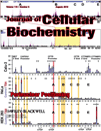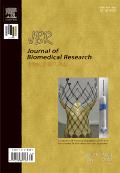
LIFE SCIENCES
Scope & Guideline
Fostering innovation in pharmacology and toxicology.
Introduction
Aims and Scopes
- Molecular Biology and Genetics:
Research pertaining to genetic regulation, gene expression, and molecular interactions, particularly in the context of diseases such as cancer and neurodegenerative disorders. - Cellular Mechanisms and Physiology:
Studies that investigate the cellular processes involved in various physiological functions and how they are altered in pathological states. - Immunology and Inflammation:
Exploration of immune responses, inflammatory processes, and their roles in health and disease, including autoimmune disorders and cancer. - Neuroscience:
Research focused on the nervous system, including neurodevelopment, neurodegeneration, and neuroinflammation, with implications for neurological diseases. - Stem Cell Biology and Regenerative Medicine:
Investigations into stem cell differentiation, potential therapeutic applications of stem cells, and mechanisms of tissue regeneration. - Metabolism and Disease:
Studies examining metabolic pathways, their dysregulation in diseases such as obesity and diabetes, and the potential for therapeutic targeting. - Microbiome and Gut Health:
Research on the interactions between the human microbiome and host health, including implications for metabolic and immune disorders. - Drug Development and Pharmacology:
Investigations into pharmacological agents, their mechanisms of action, and potential therapeutic applications in various diseases.
Trending and Emerging
- Omics Technologies:
The rise of research utilizing genomics, proteomics, metabolomics, and transcriptomics to uncover complex biological networks and their roles in disease. - Precision Medicine and Personalized Therapies:
An increasing focus on research that aims to tailor medical treatments to individual genetic and molecular profiles, aiding in the development of personalized therapies. - Microbiome Research:
A significant trend towards understanding the microbiome's role in health and disease, including its impact on metabolism, immunity, and neurological health. - Neuroinflammation and Neurodegeneration:
Emerging studies on the mechanisms of neuroinflammation and its link to neurodegenerative diseases, reflecting a growing recognition of their interplay. - Cellular Senescence:
Research into cellular senescence and its implications for aging and age-related diseases is trending, emphasizing its role in tissue homeostasis and pathology. - Therapeutic Targeting of Epigenetic Modifications:
A notable increase in studies focusing on epigenetic modifications as potential therapeutic targets, highlighting the importance of gene regulation in disease. - Extracellular Vesicles and Cell Communication:
Growing interest in the role of extracellular vesicles in intercellular communication and their potential as biomarkers or therapeutic agents. - Artificial Intelligence in Biological Research:
Emerging applications of AI and machine learning techniques in analyzing biological data, enhancing our ability to interpret complex datasets.
Declining or Waning
- Traditional Pharmacology:
There has been a noticeable decline in studies focused solely on traditional pharmacological approaches without incorporating molecular or genetic insights, indicating a shift towards more integrative and systems biology approaches. - Basic Histology and Anatomy Studies:
Research primarily centered on basic histological and anatomical descriptions is less frequent, suggesting a move towards more functional and mechanistic studies. - Animal Models without Translational Focus:
Publications using animal models for exploratory purposes without clear translational implications for human health are becoming less common, reflecting a trend towards studies that emphasize translational relevance. - In Vitro Studies without Clinical Relevance:
There is a reduction in purely in vitro studies that do not bridge to clinical applications or insights, indicating a preference for research that connects basic science with clinical outcomes.
Similar Journals

JOURNAL OF CELLULAR BIOCHEMISTRY
Unraveling the Complexities of BiochemistryJournal of Cellular Biochemistry is a premier academic journal dedicated to advancing the field of biochemistry and cellular biology. Published by Wiley, this influential journal has a significant impact factor that underscores its relevance and authority within the scientific community. With its ISSN 0730-2312 and E-ISSN 1097-4644, the journal has been on the frontier of research since its inception in 1982, and is expected to continue publishing cutting-edge studies through 2024. As evidenced by its ranking in the 2023 Scopus Quartiles, it holds a rank of Q2 in Biochemistry and Q3 in both Cell and Molecular Biology, placing it among the top tiers of scientific journals in these disciplines. The Journal of Cellular Biochemistry serves as a vital resource for researchers, professionals, and students alike, providing a platform for the dissemination of innovative ideas and findings that shape our understanding of cellular processes and biochemical pathways. Though it does not currently offer Open Access options, its robust peer-review process ensures that each publication meets the highest academic standards, thus solidifying its esteemed position in the landscape of biochemical research.

Cell Reports
Elevating Research Visibility for Global ImpactCell Reports is a prestigious open-access journal published by CELL PRESS that has firmly established itself as a leading voice in the fields of Biochemistry, Genetics, and Molecular Biology. Since its inception in 2012, the journal has provided an innovative platform for rapid dissemination of cutting-edge research, ensuring that high-quality findings are accessible to a global audience. With an impressive impact factor and ranking within the top 10% in its category, as reflected by its Q1 ranking in Scopus, Cell Reports serves a vital role in advancing scientific knowledge and fostering collaboration among researchers. The journal's commitment to the open-access model not only enhances visibility but also encourages the sharing of critical advancements in molecular biology. Situated in the Netherlands, its contributions are recognized worldwide, making Cell Reports an indispensable resource for scientists aiming to stay at the forefront of their fields and facilitate breakthroughs that may shape the future of biomedicine.

Biology Direct
Advancing biological knowledge without barriers.Biology Direct is a leading open-access journal published by BMC, dedicated to disseminating groundbreaking research in the fields of biological sciences. Since its inception in 2006, the journal has emerged as a pivotal platform for scholars, researchers, and practitioners, providing unrestricted access to high-quality, peer-reviewed articles that cover a wide spectrum of topics, including biochemistry, ecology, and applied mathematics. With an impressive ranking in the first quartile across multiple scientific categories, including Agricultural and Biological Sciences and Biochemistry, Genetics, and Molecular Biology, Biology Direct is recognized for its rigorous standards and impactful contributions within the academic community. The journal's open-access model ensures that research findings reach a global audience, fostering collaboration and innovation. Researchers and students looking to stay ahead in the rapidly evolving biological sciences will find Biology Direct an invaluable resource for knowledge and insight.

BIOMEDICAL RESEARCH-TOKYO
Advancing Biomedical Knowledge Since 1980BIOMEDICAL RESEARCH-TOKYO is an esteemed interdisciplinary journal published by BIOMEDICAL RESEARCH PRESS LTD, dedicated to disseminating pioneering research and advancements in the fields of biochemistry, genetics, and medicine. Since its inception in 1980, the journal has established itself as a reputable source of knowledge, contributing significantly to the global scientific community with its strong emphasis on innovative findings and methodologies. With a consistent presence in the Q3 quartile for both Biochemistry, Genetics and Molecular Biology and Medicine categories as of 2023, it continues to attract a diverse range of research articles. While the journal does not operate as an open access platform, it remains an essential resource for researchers, professionals, and students seeking to further their understanding of biomedical sciences. Located in Sapporo, Japan, this journal fosters collaboration and knowledge sharing among the international biomedical research community, engaging readers through its compelling studies that span from 1980 to 2024.

Journal of Biomedical Research
Innovating Research, Transforming MedicineJournal of Biomedical Research, published by Nanjing Medical University in China, is a prominent platform for groundbreaking discoveries in the fields of Biochemistry, Genetics, and Molecular Biology, as well as Medicine. With an ISSN of 1674-8301 and an E-ISSN of 1876-4819, the journal offers a vital opportunity for researchers, professionals, and students to disseminate insightful research findings. Although not currently available as an open access journal, its inclusion in the second quartile of both Biochemistry and Medicine categories underscores its growing influence and commitment to high-quality scholarship, as evidenced by its historical compliance with Scopus rankings prior to 2009. By fostering an interdisciplinary approach, the Journal of Biomedical Research aims to bridge gaps in current biomedical understanding and encourages innovative research that can lead to significant contributions in improving health outcomes. Its editorial policies guarantee rigorous peer review, making it a trusted source of knowledge in the biomedical community.

CELL
Leading the charge in innovative biochemistry research.CELL is a premier academic journal in the field of Biochemistry, Genetics, and Molecular Biology, published by CELL PRESS. Founded in 1974, this esteemed journal has steadfastly contributed to advancing our understanding of cellular processes and organisms, making it integral for researchers and practitioners alike. With an impressive impact factor that places it in the Q1 category of its field, CELL ranks #1 out of 221 in general biochemistry and genetics, achieving a remarkable 99th percentile in Scopus rankings. Though it is not currently an open-access publication, the journal regularly disseminates high-quality research that impacts the scientific community significantly. Researchers, students, and professionals seeking to stay at the forefront of innovative discoveries and methodologies in molecular biology will find CELL an invaluable resource through its comprehensive articles and reviews.

Genes & Diseases
Exploring the molecular pathways of health and illness.Genes & Diseases, published by KEAI PUBLISHING LTD, is a premier open-access journal dedicated to advancing the fields of genetics, biochemistry, and molecular biology. Established in 2014 and headquartered in Beijing, China, this journal has quickly risen to prominence, securing a place in the prestigious Q1 quartile in Biochemistry and Genetics (clinical), as well as Q2 in Cell Biology and Q1 in Molecular Biology as of 2023. With a commitment to disseminating cutting-edge research, Genes & Diseases serves as a critical platform for researchers, professionals, and students alike, ensuring that high-quality scientific work is openly accessible to the global community. The journal's exceptional impact is underscored by its selective Scopus rankings, which reflect its influence and relevance in key scientific domains, making it an essential resource for those exploring the intersections of genetics and disease pathology.

BIOCELL
Fostering Excellence in Cell ResearchBIOCELL is a distinguished peer-reviewed journal dedicated to the field of Cell Biology, published by TECH SCIENCE PRESS. Since its inception in 1995, the journal has been at the forefront of disseminating innovative research, with converged publication years extending from 1995 to 2013 and from 2015 to 2024. Although it currently holds a Q4 ranking in the Cell Biology category according to the 2023 category quartiles, BIOCELL aims to foster advancements by providing a platform for researchers, professionals, and students to share their findings in biochemistry, genetics, and molecular biology. The journal is available in both print (ISSN: 0327-9545) and digital formats (E-ISSN: 1667-5746) and seeks to attract contributions that enhance scholarly dialogue and understandings of cellular mechanisms and innovations. With a commitment to quality research and critical discourse, BIOCELL plays an important role in nurturing the scientific community within Argentina and beyond, offering vital insights that contribute to the advancement of the life sciences.

DNA AND CELL BIOLOGY
Illuminating the Path of Cellular AdvancementsDNA AND CELL BIOLOGY, published by Mary Ann Liebert, Inc, is a distinguished journal in the realms of cell biology, genetics, and molecular biology, holding a notable position in its Q3 and Q2 quartile rankings across multiple academic categories as of 2023. With an ISSN of 1044-5498 and an E-ISSN of 1557-7430, this journal has been a pivotal platform for the dissemination of cutting-edge research since its inception in 1990, extending its coverage through 2024. Situated in the United States, the journal offers high-quality peer-reviewed articles, exploring significant advancements in biological sciences while fostering interdisciplinary collaborations within the research community. Though it currently does not offer open access, subscribed institutions and individual readers benefit from its rich repository of knowledge. The journal's rigorous standards and impactful content make it an essential resource for researchers, professionals, and students alike, aiming to stay at the forefront of discoveries influencing DNA and cellular dynamics.

Frontiers in Bioscience-Landmark
Driving Impactful Research in the BiosciencesFrontiers in Bioscience-Landmark is a prestigious journal published by IMR PRESS that focuses on a diverse array of topics within the fields of biochemistry, genetics, molecular biology, immunology, and microbiology. With the ISSN 2768-6701 and E-ISSN 2768-6698, this journal has carved a significant niche since its inception in 1996, making its mark in contributions to the scientific community all the way through to 2024. Having achieved a respectable Q2 cohort rank in multiple categories, including biochemistry and immunology, it stands out for its impactful research, evidenced by its current Scopus rankings which highlight it as a vital resource for ongoing studies and advancements in the biosciences. Despite not being open access, the journal ensures that readers have access to high-quality research articles that are peer-reviewed and designed to foster academic discourse. The importance of Frontiers in Bioscience-Landmark lies in its commitment to disseminating innovative findings that can significantly enhance our understanding of biological sciences, making it an essential read for researchers, professionals, and students alike.